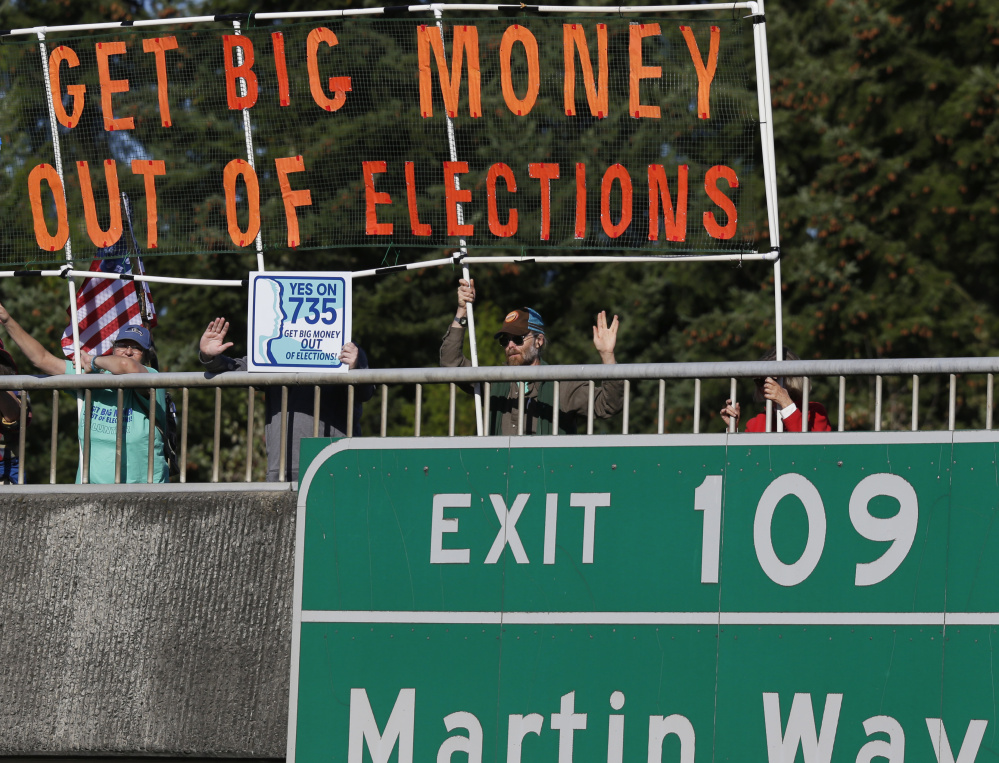Editor’s note: This story is part of an occasional Associated Press series examining the issues at stake in the presidential election between now and Election Day. Read more from “Why it matters.”
THE ISSUE
Voters are disgusted with the way political races are paid for – disproportionately by big-money donors, including those who stand to gain or lose from government decisions. The rules even allow donors to hide their identities by giving to politically active nonprofit groups that don’t file detailed public paperwork about their finances.
The system leaves everyday Americans fearing their voices are being drowned out by these moneyed interests.
Here’s one example of how that can happen: Hillary Clinton headlined more closed-door fundraisers in August than there were days of the month. The spree left her with a record amount of money, but at the expense of spending time with voters.
To be sure, donors are necessary; they pay the ever-increasing tab for campaigns. So far, donors have pumped more than $1.7 billion into the presidential race, according to an Associated Press tally of election and advertising records.
Outside groups that face no contribution limits account for about one-third of that total. Money has been pouring into those groups ever since the 2010 Supreme Court decision in a case known as Citizens United. That ruling and subsequent court decisions and regulatory changes made it clear to wealthy donors that they can give as much as they’d like, so long as the candidates themselves aren’t controlling how that money gets spent.
It’s enough to make some candidates say they want to throw the whole system out and start fresh.
WHERE THEY STAND
Both presidential candidates talk a good game when it comes to money in politics, but both fail to back their words with action.
Clinton, a Democrat, says she’d like to get “unaccountable money out of politics.” She has vowed to “overturn” Citizens United – something she cannot directly do as president – either by nominating Supreme Court justices who would rule differently or proposing a constitutional amendment to undo it. It’s extremely difficult to amend the founding document. She also has called upon Congress to require outside groups to disclose “significant” political spending. That’s a murky request unlikely to go anywhere in a divided Congress.
Republican Donald Trump has denounced “corrupt” outside groups and disparaged his rivals as “puppets” of big donors. Yet he has not proposed any policies that would change the campaign finance system.
Meanwhile, Clinton and Trump have both sought out major donors in this costly presidential race. Each flouts the $2,700-per-donor contribution limit by partnering with their respective parties, which can accept far more money than the candidates can on their own. And both benefit from multimillion-dollar super PACs and their even more controversial cousins, groups that don’t disclose their donors at all.
WHY IT MATTERS
Concern about money in politics has been on vivid display throughout the 2016 race.
In the primaries, Trump and Democrat Bernie Sanders used unconventional methods to highlight their stated aversion to the influence of wealthy donors. Sanders, a Vermont senator, fueled his upstart bid with small contributions made mostly online by millions of supporters. It was a crowd-sourcing antidote to big money in politics.
Trump, a businessman who says he has billions of dollars at his disposal, was able to largely eschew donors during the GOP primary by writing his own checks. In all, he has put more than $50 million into his presidential bid. In the general election, he’s been stingier with his own money. He’s better than Clinton at raising “Sanders-style” money, but he also now pursues the same major donors he once dismissed.
Negative views on money in politics transcend party lines. An AP-NORC Center for Public Affairs Research survey last year found that nearly nine in 10 respondents thought that limiting outside spending would curb the influence of money in politics at least somewhat, and more than half see outside groups such as super PACs as an unacceptable way to finance politics.
Action remains elusive, even though both candidates claim they want things to change.
Send questions/comments to the editors.



Success. Please wait for the page to reload. If the page does not reload within 5 seconds, please refresh the page.
Enter your email and password to access comments.
Hi, to comment on stories you must . This profile is in addition to your subscription and website login.
Already have a commenting profile? .
Invalid username/password.
Please check your email to confirm and complete your registration.
Only subscribers are eligible to post comments. Please subscribe or login first for digital access. Here’s why.
Use the form below to reset your password. When you've submitted your account email, we will send an email with a reset code.